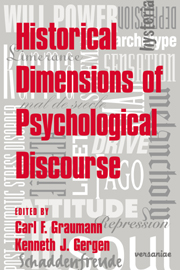Book contents
- Frontmatter
- Contents
- List of contributors
- 1 Psychological discourse in historical context: An introduction
- Part I Disciplining psychological discourse
- Part II History as culture critique
- Part III Early antecedents
- Part IV Lived history
- 13 Emancipation – a failed project? Remarks on the discourse of radical critique
- 14 The transcendental alarm
- Author index
- Subject index
14 - The transcendental alarm
Published online by Cambridge University Press: 20 October 2009
- Frontmatter
- Contents
- List of contributors
- 1 Psychological discourse in historical context: An introduction
- Part I Disciplining psychological discourse
- Part II History as culture critique
- Part III Early antecedents
- Part IV Lived history
- 13 Emancipation – a failed project? Remarks on the discourse of radical critique
- 14 The transcendental alarm
- Author index
- Subject index
Summary
About 1,500 years ago, Augustine of Hippo thanked God for his mother's milk:
For neither my mother nor my nurses stored their own breasts for me; but Thou didst bestow the food of my infancy through them, according to Thine ordinance, whereby Thou distributest Thy riches through the hidden springs of all things.
(Augustine, 400/1949, I, p. 7)God was the active agent in the ordinary events of life; nothing moved or intended or played except under His prescription and with His knowledge. Of course, as the Western desire to know broadened, the Augustinian “hidden springs” subtly became a significant source of error and of evil. The task of the talented believer became not merely to accept what was but to change the present – and to change it for the better. Over centuries, the core notion of salvation escaped its eschatalogical boundaries and became – almost drunkenly, in the rational explosion of the seventeenth century – the guiding spirit of human action. The shift from salvation as a gift of God, delivered in eternity, over to an immediate and secular consequence of social service was a process that took centuries, that was confined largely to European cultures, and that has never been complete in any culture. The shift had several discernible components – the deification of Nature, the belief in human progress, and the opportunities of scientific analysis, chief among them.
- Type
- Chapter
- Information
- Historical Dimensions of Psychological Discourse , pp. 263 - 274Publisher: Cambridge University PressPrint publication year: 1996
- 1
- Cited by



